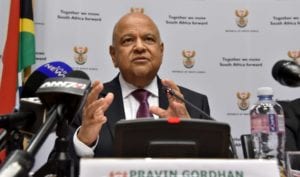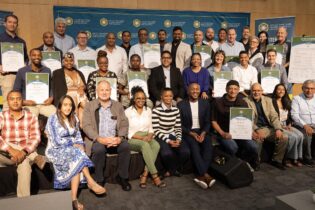- 2 billion for industrial infrastructure in special economic zones and industrial parks
- 9 billion for broadband implementation
- 8 billion for provincial roads maintenance
- 4 billion for the national road network
- 5 billion for water infrastructure
- R600 million for the Social Housing Regulatory Authority
- 5 trillion for public procurement
Roads and transport
In line with the increase in road traffic volumes, Gordhan has allocated R10.8 billion in 2017/18 for the Provincial Roads Maintenance Grant. SANRAL will also receive R15.4 billion over the same period for strengthening and maintenance of the national road network, which now stands at 21 946 km. A further R6.2 billion has been allocated for the development and operation of integrated public transport networks through the Public Transport Network Grant. The Passenger Rail Agency of South Africa continues to implement its modernisation and rolling stock renewal programme. Over the medium term, R16.7 billion is allocated for 70 new train-sets for Metrorail. “We will continue to work with our cities to improve the safety and reliability of public transport services. Commuter rail currently provides for over 20% of all passengers carried in the cities. This budget provides resources to subsidise 457 million rail passenger trips next year, as well as ongoing support to upgrade rolling stock and improve signalling systems,” said Gordhan.Water provision
R18.4 billion has been allocated over the medium term to the Regional Bulk Infrastructure Grant and R12.5 billion to the Water Services Infrastructure Grant. These allocations continue to prioritise water provision in the 27 most impoverished district municipalities.IT infrastructure
The Department of Telecommunications and Postal Services will receive R1.9 billion over the medium term to invest in high-speed internet connections in public buildings and schools in eight NHI pilot districts.Housing and urban development
To support higher density housing, subsidies for social housing have been rationalised and R600 million over the medium term is reprioritised to the Social Housing Regulatory Authority for investment in rental housing units.According to the minister, all of South Africa’s metropolitan municipalities are undertaking a portfolio of catalytic, integrated urban development projects that will lead the way in reshaping cities:
- In eThekwini, the Cornubia mixed development node will yield 25 000 housing units, while over R13 billion in private sector investment in the nearby Dube Trade Port has been identified. A R30 billion inner city regeneration programme is under way.
- In Ekurhuleni, development along the corridor linking Tembisa to Kempton Park has been prioritised.
- Cape Town has adopted a transit-oriented development strategy including mixed-use development of the Bellville Transport Interchange, upgrade of the Phillipi East Station Precinct and the redevelopment of the Athlone Power Station.
- In Mangaung, the airport development node is under construction and 8 500 affordable housing units will be built in and around the inner city of Bloemfontein.
- In Johannesburg, there is further progress with the “corridors of freedom” linking Soweto, Alexandra, Sandton and the CBD. This includes the new bridges that can be seen along the M1.
Public procurement
Public procurement will amount to about R1.5 trillion over the next three years. Gordhan explained that government will pay roughly R500 billion a year for the delivery of goods and services. He elaborated: “Not transfers, or hand-outs, or cash distributions. The purpose is to acquire the infrastructure and operational inputs required for effective service delivery.” The minister also noted that public procurement is an important strategic vehicle for developing local industries, broadening economic participation and creating work opportunities. Last month government gazetted new preferential procurement regulations to achieve the following:- Where large firms are awarded tenders of R30 million or more, 30% of the contract value must go to small or black-owned enterprises, where feasible.
- Procurement authorities are now empowered to set clear targets to promote black- owned and women-owned businesses, participation of youth and disabled persons and opportunities for rural enterprises and co-operatives.
- South African suppliers will enjoy preference in respect of goods with significant local content, thus supporting job creation.







